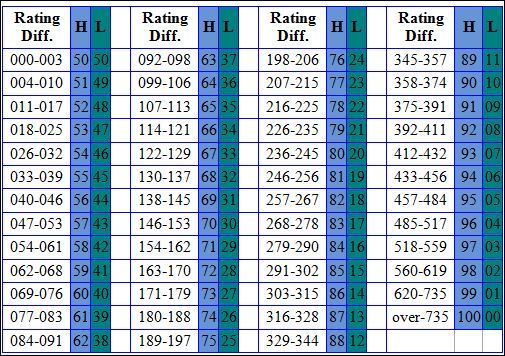Well, the question came to my mind while watching a video annotation of a US Champ game between So and a junior GM whose game I don't remember. The 14 year old guy defeated So (with around 200 points difference in rating, which is more significant at higher levels I guess).
Sam Sevian!
Ok, the question is simple. I am 1450 in rapid on Chess.com; would it be possible to win (or draw) against a, let's say, 1800 player without relying on a big blunder by him?
First maybe it's useful to consider that all games are won because one side makes mistakes.
So as you might expect my answer here is no. You could only win after a big blunder (or multiple smaller blunders).
What would be the maximum difference in rating for a game with a result which is not completely predictable?
This is an interesting question. First of all consider this chart:

Notice a difference of 200 points means that the expected result is 76% to 24%. In a 10 game match this means the stronger player would be expected to score 7.5 to the weaker player's 2.5 (any mix of wins and draws). So as you can see, it's never "completely predictable."
In my personal experience, I'm still optimistic against an opponent rated 200 above me. 300 not so much, and at 400 I play my best, but honestly I expect to lose.
The chart is just what the math says. People have crunched some real life data to see how it compares. What they found is when the gap gets much wider (say, a 700 point difference) the lower rated players score better than they should. Something like 5% instead of 1%
Against a much stronger player you have less chances of winning in a dry technical position. Their experience and knowledge will really outshine yours.
Because much of their strength comes from study and experience, you have better chances of winning if you minimize that and make them rely on calculation. You do this by playing a sharp, aggressive, chaotic game. It gives you a sort of puncher's chance. If they miscalculate you can win.
Don't go nuts from the opening, develop all your pieces for example, but yes, essentially play for tactics.
The above is what you'd do if you must win (lets say the last round of a tournament and you want the cash prize or a title). However my advice for most of your games against much stronger opponents is to play what you know best. Yes, even if it's a stale defensive positional game where you're more likely to lose. Because that way, you maximize what you can learn from the game. If you play outside of your usual style and positions, your mistakes are more likely to be simple oversights due to inexperience.









Well, the question came to my mind while watching a video annotation of a US Champ game between So and a junior GM whose game I don't remember. The 14 year old guy defeated So (with around 200 points difference in rating, which is more significant at higher levels I guess).
Ok, the question is simple. I am 1450 in rapid on Chess.com; would it be possible to win (or draw) against a, let's say, 1800 player without relying on a big blunder by him?
If no, what would be the maximum difference in rating for a game with a result which is not completely predictable?
If yes, how to play it? Try a rare, puzzling opening where innacuracies are more likely? Play solid and defensive in the opening and hope for a draw? Try an open game with lots of tactics, hoping to outcalculate him? Try to defeat him positionally?
All seem pretty impossible, but even if the odds were very small, I would try to grasp them and maximise them by steering the type of game into some specific direction.
So, any opinion is welcome.
Thank you very much